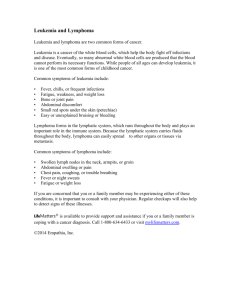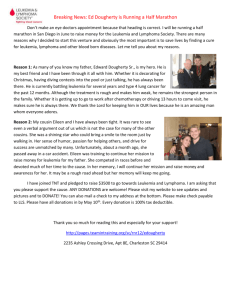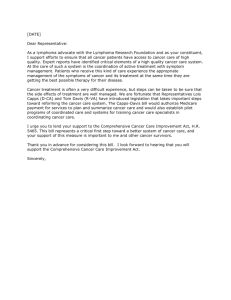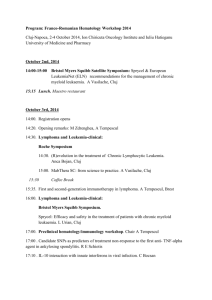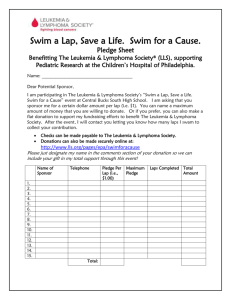Hematology
advertisement
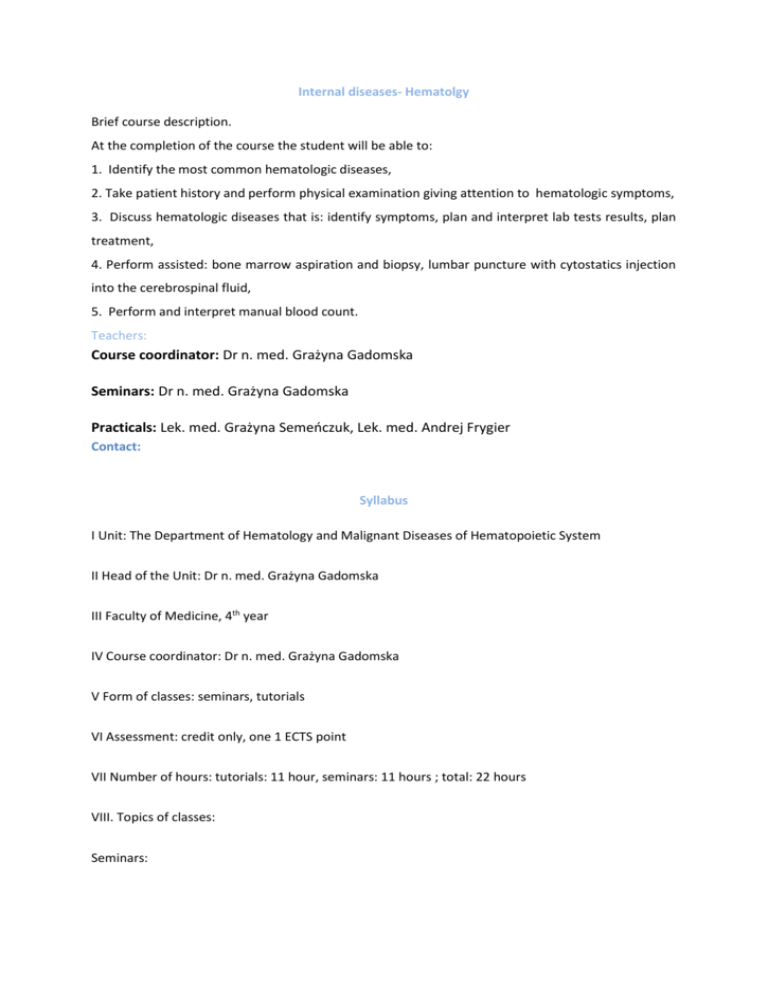
Internal diseases- Hematolgy Brief course description. At the completion of the course the student will be able to: 1. Identify the most common hematologic diseases, 2. Take patient history and perform physical examination giving attention to hematologic symptoms, 3. Discuss hematologic diseases that is: identify symptoms, plan and interpret lab tests results, plan treatment, 4. Perform assisted: bone marrow aspiration and biopsy, lumbar puncture with cytostatics injection into the cerebrospinal fluid, 5. Perform and interpret manual blood count. Teachers: Course coordinator: Dr n. med. Grażyna Gadomska Seminars: Dr n. med. Grażyna Gadomska Practicals: Lek. med. Grażyna Semeńczuk, Lek. med. Andrej Frygier Contact: Syllabus I Unit: The Department of Hematology and Malignant Diseases of Hematopoietic System II Head of the Unit: Dr n. med. Grażyna Gadomska III Faculty of Medicine, 4th year IV Course coordinator: Dr n. med. Grażyna Gadomska V Form of classes: seminars, tutorials VI Assessment: credit only, one 1 ECTS point VII Number of hours: tutorials: 11 hour, seminars: 11 hours ; total: 22 hours VIII. Topics of classes: Seminars: 1. Dyserythropoietic anaemias, iron deficency anemia, vitamin B12 deficiency anaemia, folic acid deficency anaemia, anaemias secondary to chronic disease – diagnostic evaluation, symptomatology, treatment. 2. Hemolytic Anaemia and Aplastic Anaemia – diagnostic evaluation, symptomatology treatment. 3. Myeloproliferative Neoplasms – chronic myeloid leukemia, polycythemia vera, essential thrombocythemia - diagnostic criteria, clinical view, treatment. 4. Hodgkin Lymphoma – histological classification, symptomatology, treatment 5. Non-Hodgkin Lymphoma - WHO 2008 classification, prognostic factors, diagnosis and treatment, characteristic the predominant types of Non-Hodgkin Lymphoma: diffuse large Bcell lymphoma, follicular lymphoma, marginal zone B-cell lymphoma, mantle cell lymphoma, Burkitt lymphoma 6. Inherited Coagulation Disorders: Hemophilia A and B, Von Willebrand disease symptomatology, treatment 7. Thrombocytopenic Purupura: immune thrombocytopenic purpura, thrombotic thromobocytopenic purpura, hemolytic-uremic syndrome - etiopathogenesis, symptomatology, treatment. Tutorials: 1. Acute Myeloid Leukemia, Acute Lymphoblastic Leukemia in Adults– , diagnostic evaluation, symptomatology, chemotherapy, support treatment. 2. Chronic Lymphocytic Leukemia, B-Cell Prolymphocytic Leukemia, Hairy Cell Leukemia diagnostic evaluation, prognostic factors, symptomatology, treatment 3. Myelodysplastic Syndrome – etiopathogenesis, WHO classification, symptomatology, prognostic index, treatment 4. Multiple Myeloma –definition, diagnostic evaluation, symptomatology, treatment IX. Self-study topics 1. Hematopoiesis and Hematologic Diagnostic. 2. Acquired and Inherited Vascular Hemostatic Disorders 3. Basics of Transfusion Medicine 4. Basics of Hematologic Stem Cell Transplantation RULES AND REGULATIONS [for students who started study after academic year 2012/213] 1. Hematology classes will be held for 3 days in The Department of Hematology and Malignant Diseases of Hematopoietic System in Dr Jan Biziel Univeristy Hospital No. 2. 2. The course includes 5 hours of seminars and 10 hours of practicals. All students are obliged to participate in seminars and practicals. 3. Practicals take place in groups of 5-6 students under supervision of medical doctor – either a hematology or an internal medicine specialist. 4. Absences are not permitted unless they are excused. (doctor's certificate) 5. Students are obliged to make up for any missed classes: either by joining other groups or arranging individual tutorials with the teacher during his/her hospital duty hours. 6. Students should be prepared for each class. 7. During the practicals students are obliged to bring stethoscope, wear white medical coat and hospital shoes. 8. During the practicals students must follow the instructions of an assistant and other clinic staff. 9. If student suffers from respiratory tract infection (or other infectious disease) - absolutely must inform the assistant about this fact. Assistant will be able to apply appropriate safety procedures. Most patients of Hematology Department have immunodeficiency! 10. The credit is given by the Head of The Department of Hematology and Malignant Diseases of Hematopoietic System. In order to obtain the credit students are expected to attend each class. Positive opinion from an assistant is necessary. 11. Booklist: Dan Longo, Anthony Fauci, Dennis Kasper, Stephen Hauser, J. Jameson, Joseph Loscalzo Harrison's Principles of Internal Medicine, 18th Edition, McGraw-Hill Professional, July 21, 2011 M Turgeon, Clinical Hematology Theory and Procedures, Lippincott Williams & Wilkins, 2011
